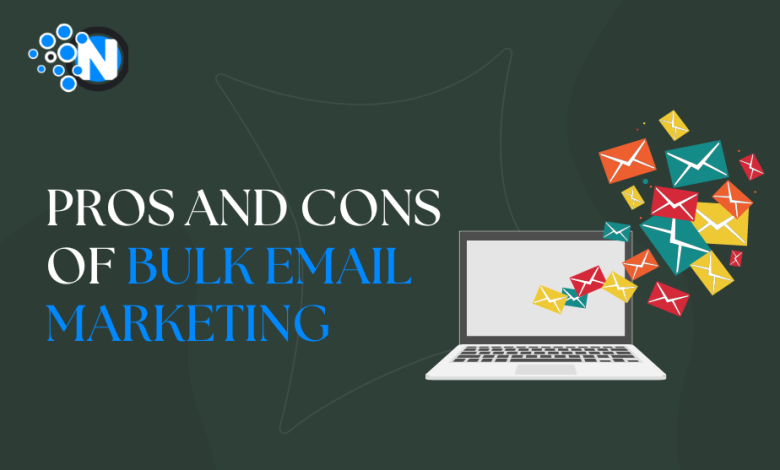Analyzing the Pros and Cons of Bulk Email Marketing

Bulk email marketing has become a prominent marketing technique for organizations in various industries in today’s digital age. Bulk email enables businesses to efficiently reach a large number of people, allowing them to make personal connections with potential consumers and build ties with existing ones.
If, after reading this article, you are thinking about using bulk email marketing, your best bet is to use the bulk email services.
Here is an example of the statistics that such services provide [source].
However, like any marketing tool, bulk email has its pros and cons. In this article, we will explore the key advantages and disadvantages of bulk email marketing.
Pros of Bulk Email Marketing
Let’s first look at the positive aspects of this tool and find out why many businesses love it.
Wide Audience Reach
One of the main benefits of bulk email marketing is the ability to reach a large number of people. Unlike traditional marketing tactics, bulk email enables firms to deliver messages concurrently to hundreds or even millions of people. This vast reach allows firms to boost brand exposure and consumer base. Businesses might possibly acquire new clients who would not have known about their products or services if they reached a bigger audience. Bulk email marketing’s broad audience reach may considerably boost brand exposure and aid in business success.
Read Also: Pro Tips for Building a Strong SaaS Brand Using Email Marketing
Enhanced Marketing Effectiveness
Another advantage of bulk email marketing is that it increases the efficacy of marketing initiatives. Companies may use bulk email to send customized communications suited to their target audience’s unique interests and demands. Businesses may develop a more meaningful relationship with recipients by sending tailored information, improving the probability of engagement and conversion. Personalization in mass email marketing extends beyond merely using recipients’ names. The audience is segmented based on demographics, preferences, previous interactions, or purchasing history.
Companies can create appealing email content that resonates with each reader, addressing their problem areas and delivering appropriate solutions by utilizing data and analytics. Personalization improves the entire user experience and increases the likelihood of recipients doing the intended action, such as making a purchase or subscribing to a service.
Cost-Effectiveness
One of the notable advantages of bulk email marketing is its cost-effectiveness compared to traditional marketing methods. Sending emails is significantly more affordable than printing and distributing physical brochures, flyers, or promotional materials. This aspect is particularly beneficial for small and medium-sized enterprises (SMEs) that often operate on limited marketing budgets. Bulk email eliminates the costs associated with printing materials, such as design, production, and physical distribution. Instead, businesses can create and send electronic messages, reducing printing, paper, postage, and logistics expenses.
Furthermore, bulk email enables for easy scaling because the cost per email remains essentially consistent regardless of recipient list size. This scalability allows SMEs to reach a broader audience without incurring significant additional expenditures.
Cons of Bulk Email Marketing
Now look at this tool from the negative side in order to understand the situation as a whole.
Spam Filters
The availability of spam filters in various email platforms and providers is one of the issues connected with bulk email marketing. These filters are intended to detect and route unsolicited or undesired emails, including bulk emails, to the recipient’s spam or trash folders.
As a result, some communications may fail to reach their intended recipients or may go overlooked in the midst of spam email congestion. Spam filters examine email content, sender reputation, and other characteristics to decide if an email is authentic or spam. While these filters are meant to protect consumers from undesired communications, they can occasionally misclassify valid bulk emails as spam, causing businesses to have deliverability challenges.
Potential for Irritation
One of the possible drawbacks of mass email marketing is the danger of annoying recipients if the approach is not implemented effectively. When receivers receive excessive emails or communications unrelated to their interests and needs, it can cause dissatisfaction and frustration. The excessive frequency of bulk emails might overwhelm receivers and create an unfavorable impression of the sender.
Bombarding recipients with multiple emails in a short period can be seen as intrusive and may result in them unsubscribing from the mailing list or, worse, marking the emails as spam. This affects the relationship with the individual recipient and the sender’s reputation and deliverability rates.
Legal and Ethical Considerations
Bulk email marketing is subject to a number of legal and ethical issues that organizations must follow in order to remain compliant and safeguard their brand. Failure to follow these principles may result in legal implications as well as damage to the company’s brand image. Obtaining agreement from recipients before sending mass emails is a fundamental legal need.
This consent can be explicit, where recipients explicitly opt-in to receive marketing communications, or implied, where there is an existing business relationship. It is essential for businesses to have a clear record of consent, including how and when it was obtained, to demonstrate compliance if required.
Conclusion
Bulk email marketing offers businesses the potential to reach a wide audience, enhance marketing effectiveness, and achieve cost efficiency. However, navigating the challenges associated with this marketing strategy is crucial. The wide audience reach provided by bulk email marketing allows businesses to increase brand visibility and attract new customers. Businesses may increase the success of their marketing initiatives and develop meaningful connections with recipients by sending individualized communications. Furthermore, the low cost of bulk email marketing makes it an appealing choice, particularly for small and medium-sized businesses with restricted budgets. Nonetheless, firms must be mindful of any potential disadvantages. Spam filters jeopardize the deliverability of bulk emails, therefore organizations must follow best practices to maximize their reach.




